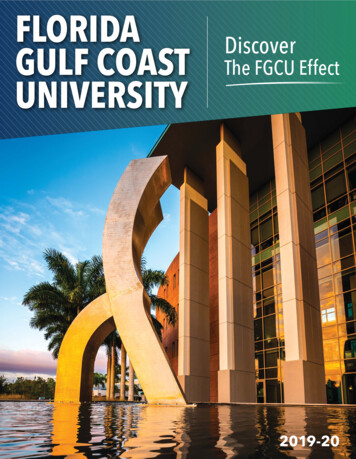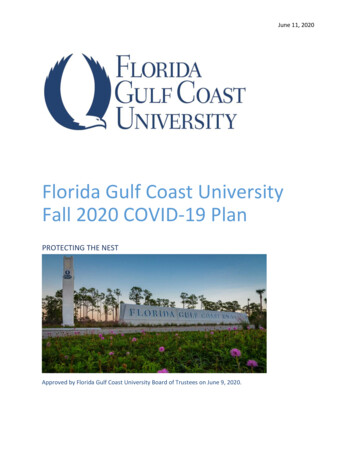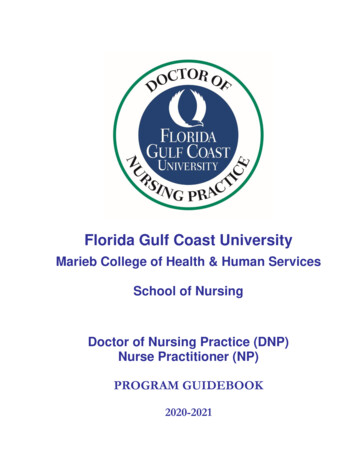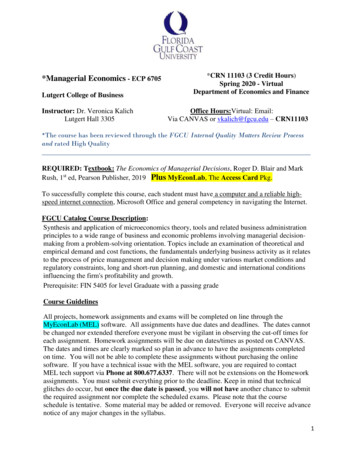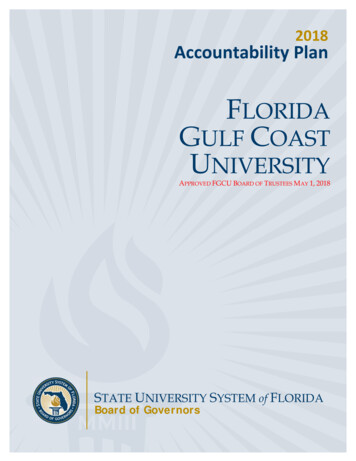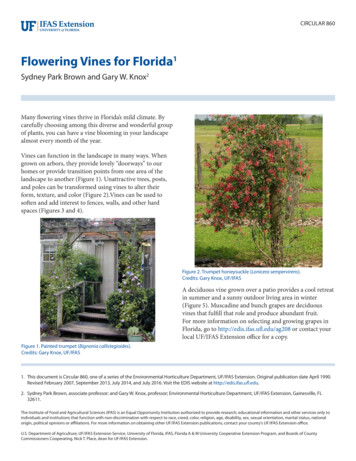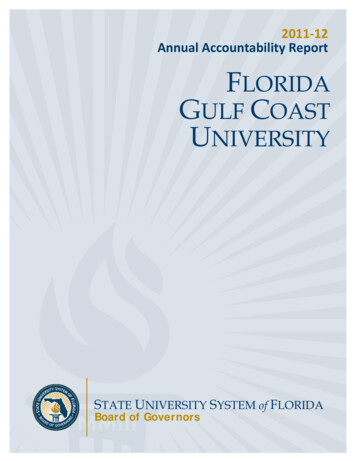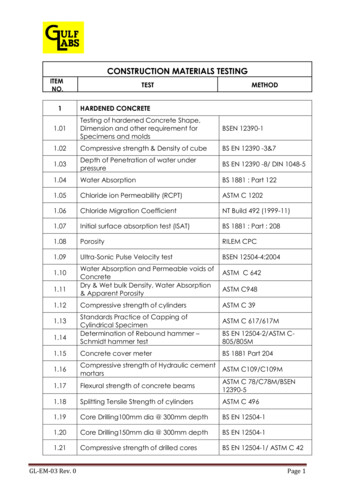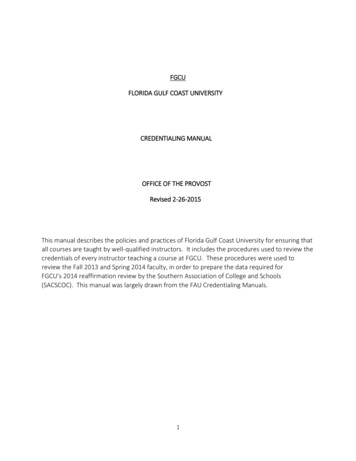
Transcription
FGCUFLORIDA GULF COAST UNIVERSITYCREDENTIALING MANUALOFFICE OF THE PROVOSTRevised 2-26-2015This manual describes the policies and practices of Florida Gulf Coast University for ensuring thatall courses are taught by well-qualified instructors. It includes the procedures used to review thecredentials of every instructor teaching a course at FGCU. These procedures were used toreview the Fall 2013 and Spring 2014 faculty, in order to prepare the data required forFGCU’s 2014 reaffirmation review by the Southern Association of College and Schools(SACSCOC). This manual was largely drawn from the FAU Credentialing Manuals.1
ContentsPOLICIES AND GUIDELINESFGCU PolicyFGCU GuidelinesTranscripts and degreesGraduate instructionUndergraduate instructionPROCEDURE FOR REVIEW OF FACULTY/INSTRUCTOR CREDENTIALSCredentialing databaseOverview of the review processDetails of the credentialing process and databaseFUTURE CREDENTIALING MAINTENANCE APPENDIXAppendix A: FGCU Faculty Credentialing StandardAppendix B: Terminal Degrees by DegreeAppendix C-1: Instructions, Letter of JustificationAppendix C-2: Form, Letter of JustificationAppendix C-3: Justification ChecklistAppendix D: Adjunct, Overload and Summer Salary AgreementPOLICIES AND GUIDELINESFGCU PolicyFlorida Gulf Coast University subscribes to the values and practices developed through theregional body for academic self-regulation, the Southern Association of Colleges and SchoolsCommission on Colleges (SACSCOC). SACSCOC states the basic standards that an institutionshould meet in order ensure that its faculty holds the appropriate level and kind of credentials asfollows:2
3.7.1. The institution employs competent faculty members qualified to accomplish themission and goals of the institution. When determining acceptable qualifications of itsfaculty, an institution gives primary consideration to the highest earned degree in thediscipline in accordance with the guidelines listed below. The institution also considerscompetence, effectiveness, and capacity, including, as appropriate, undergraduate andgraduate degrees, related work experiences in the field, professional licensure andcertifications, honors and awards, continuous documented excellence in teaching, orother demonstrated competencies and achievements that contribute to effectiveteaching and student learning outcomes. For all cases, the institution is responsible forjustifying and documenting the qualifications of its faculty.FGCU subscribes to this standard established by SACSCOC, beginning with the principle thatconsideration of faculty credentials begins with the instructional assignment. The content/levelof the course or other instructional assignment determines the qualifications required to teachit. This is reflected in FGCU’s credentialing manual dated 2014 (see Appendix A, Provost’sMemorandum on Instructional Qualifications and Appendix B FGCU Faculty Credential Standard).FGCU GuidelinesFGCU’s credentialing guidelines are patterned after the guidelines provided by SACSCOC, whichspecify the degrees and coursework qualifications that are appropriate to different kinds ofinstructional assignments; specifically:3.7.1.aFaculty teaching general education courses at the undergraduate level:doctoral or master’s degree in the teaching discipline or master’s degree with aconcentration in the teaching discipline (a minimum of 18 graduate semester hours inthe teaching discipline).3.7.1.dFaculty teaching baccalaureate courses: doctoral or master’s degree in theteaching discipline or master’s degree with a concentration in the teaching discipline(minimum of 18 graduate semester hours in the teaching discipline). At least 25 percentof the discipline course hours in each undergraduate major are taught by facultymembers holding the terminal degree—usually the earned doctorate—in the discipline.3.7.1.eFaculty teaching graduate and post-baccalaureate course work: earneddoctorate/terminal degree in the teaching discipline or a related discipline.3.7.1.fGraduate teaching assistants: master’s in the teaching discipline or 18graduate semester hours in the teaching discipline, direct supervision by a facultymember experienced in the teaching discipline, regular in-service training, and plannedand periodic evaluations.3
SACSCOC recognizes that a faculty member’s qualifications for a particular teaching assignmentmay include or may rest on professional or artistic accomplishments, licensures andcertifications, and a range of other evidence of “competence, effectiveness and capacity” insuccessfully meeting the learning objectives of a given course. FGCU also acknowledges thatthese additional qualifications may be considered, and has created a set of policies for theirdocumentation that ensures that all faculty members meet the highest standards of preparationfor a given instructional assignment.FGCU’s guidelines are described in more detail below, including FGCU’s requirement that facultyholding the master’s degree must document 18 graduate credit hours relevant to the disciplineand/or a record of substantial and current accomplishments in the field of the teachingassignment.Transcripts and degreesThe hiring authority (chair/director/dean) is responsible for ensuring that FGCU has an officialcopy of the transcript for the highest academic credential earned by the prospective instructoron file in the Office of the Provost. An official transcript is sent directly from one institution toanother. The transcript should be sent directly to the hiring authority. A copy may be kept in thedepartment/school or college; the original will be kept in the Office of the Provost.FGCU requires that degrees earned in the United States be from institutions that are regionallyaccredited.Foreign degrees must be evaluated by an agency certified by the National Association ofCredential Evaluation Services (NACES) to establish their equivalency to American degrees. Acourse-by-course evaluation is necessary for all degrees except terminal degrees in the teachingfield. If an abstract (or equivalent) of the dissertation or other terminal project can be provided,a course-by-course analysis is not required for a terminal degree in the teaching field.Documentation in a foreign language must be translated by an appropriate external agency.Until appropriate documentation of the earned terminal or highest degree as relevant to thefield of instruction is received in the Office of the Provost, the university will accept no claimsabout the prospective faculty member’s qualifications for the instructional assignment.Graduate instructionAll faculty teaching graduate courses or otherwise responsible for graduate credit must hold anearned terminal degree in the teaching discipline. Faculty who hold the appropriate terminaldegree that is not in the teaching discipline (i.e., “related discipline”) can be credentialed to4
teach at the graduate level if they demonstrate their qualifications on the basis of graduatecoursework and/or current accomplishments in research or relevant professional and artisticfields. A current curriculum vitae and transcript for the highest academic credential earned mustbe on file with Office of the Provost. These standards apply to both compensated anduncompensated graduate instruction.Terminal degree in teaching disciplineA person who has earned a terminal degree in the teaching discipline is qualified to teachgraduate courses in that discipline. In consultation with deans and chairs, FGCU’s Provost hasdetermined the list of terminal degrees appropriate to the instruction offered in FGCU’s highlyvariable academic units. (See Appendix B for a list of all terminal degrees recognized by FGCU forits academic programs.)The list of terminal degrees associated with each academic program specifies the terminaldegree that qualifies the person holding it to teach a particular course or set of courses. Someacademic programs have a single terminal degree in the teaching field; other units may havemultiple teaching fields and several appropriate terminal degrees. Academic programs rangefrom the homogeneous (B.A. in History, with a single degree) to the heterogeneous (B.A. inEnvironmental Studies, with 23 differently-named terminal degrees). Heterogeneous academicprograms have often developed as an original discipline has given rise to more specializeddegrees over the decades or when a new multi-disciplinary field emerges. Academic programswith multiple terminal degrees typically associate those degrees with a subset of the coursesoffered. In all cases, chairs of departments/deans of colleges/directors of schools are responsiblefor ensuring that faculty members are assigned to courses, theses, dissertations and other formsof instruction (e.g., Directed Independent Studies or DIS) solely within their areas of expertise.Terminal degree outside of the teaching discipline (“related discipline”)Prospective instructors without a terminal degree in the teaching discipline (but do hold aterminal degree) may qualify to teach graduate courses, serve on dissertation committees, oroffer other forms of graduate credit through one or both of the following:5
Documentation of 18 graduate semester credits of coursework that can serve as thebasis for the instructional assignment.Note: Documentation must be appropriate to the course being taught. An officialtranscript (or, in the case of a foreign degree, an approved agency’s evaluation of theequivalency of the foreign degree and its courses) must be used in this documentation. Ifthe level/content of the coursework is not clear, the chair/director/dean should seekadditional information from the degree-granting institution. Credits must bedocumented by course prefix/number, course name, year in which the credits wereearned, and the institution/degree program in which they were earned. These graduatesemester credit hours must be made up of formal coursework. Thesis, dissertation,internship, and similar credits do not count towards this documentation.Documentation of a record of substantial and current accomplishments in the field ofthe teaching assignment.Note: Documentation must be appropriate to the course being taught.Accomplishments must be documented by the hiring authority. Documentation wouldinclude such items as: abstracts of published work, taken directly from the journals orproceedings; evidence of book publication, including the rigor of the reviewing processand the press; copies of published reviews of an exhibition or performance; copies ofbook reviews published in scholarly journals or similarly significant venues; dissertationabstracts, listing the committee and the institution. In all cases, the accomplishmentsmust be independently verified. For all accomplishments cited, the hiring authorityshould be prepared to provide the level of documentation required for the promotionportfolio, as this provides the best guide to comprehensive documentation ofaccomplishments. All documentation must be on file in the academic unit, available forreview upon request by dean/provost or designee.The chair/director completes the documentation of qualifications using the Letter ofJustification template for the instructional assignment. If the dean finds the documentation to beappropriate, it is forwarded to the Provost. The Provost or designee will determine whether thenarrative of accomplishments provides sufficient clear and compelling evidence that the personis qualified for the instructional assignment.When the narrative is not sufficiently strong, either the dean or the Provost will require thehiring authority to provide a more detailed letter of justification of how the individual’squalifications prepare him or her for the particular instructional assignment. This justificationrequires:6
a course matrix that identifies key course learning objectives and explains the evidencefor concluding that the individual is prepared to meet those objectives; documentationof the evidence of accomplishment; anda narrative justification that explicitly addresses how the individuals’ accomplishmentsconstitute a level of preparation for the instructional assignment comparable to that of aterminal degree in the teaching field and how the individual’s graduate degreecontributed to his/her accomplishment and preparation to teach this course.(See Appendix D-1 for the instructions for completing the Letter of Justification.)Undergraduate instructionTerminal degree within the teaching disciplineThose holding the terminal degree in the teaching field are qualified for any instructionalassignment within that field, provided that their chair/director has concluded that they haveeither the graduate training or have acquired the knowledge base for the particular course. In allcases, chairs of departments and directors of schools are responsible for ensuring that facultymembers are assigned to courses, directed independent studies, and honors theses solely withintheir areas of expertise. FGCU assumes that professional development is an ongoingresponsibility of full-time faculty. Professional development appropriately includes thedevelopment of new fields of competency as well as staying current in the fields of one’sgraduate study.Master’s degree or terminal degree outside the teaching disciplineFaculty who hold a master’s degree and faculty who hold a terminal degree outside the teachingfield (i.e., related discipline) must document their qualifications to teach a particular coursethrough graduate coursework and/or a record of substantial and current accomplishments in thefield of the teaching assignment. The hiring authority would need to provide one or both of thefollowing:Documentation of 18 graduate semester credits of coursework that can serve as thebasis for the instructional assignment.Note: Documentation must be appropriate to the course being taught. Credits must bedocumented by course prefix/number, course name, year in which the credits wereearned, and the institution/degree program in which they were earned. An officialtranscript (or, in the case of a foreign degree, an approved agency’s evaluation of theequivalency of the foreign degree and its courses) must be used in this documentation. Ifthe level/content of the coursework is not clear, the chair/director should seek additional7
information from the degree-granting institution. These graduate semester credit hoursmust be made up of formal coursework. Thesis, dissertation, internship, and similarcredits do not count towards this documentation, nor do courses on how to teach.Documentation of a record of substantial and current accomplishments in the field of theteaching assignment.Note: Documentation must be appropriate to the course being taught.Accomplishments must be documented by the hiring authority. Documentation wouldinclude such items as: abstracts of published work, taken directly from the journals orproceedings; copies of published reviews of an exhibition or performance; copies of bookreviews published in scholarly journals or similarly significant venues; dissertationabstracts, listing the committee and the institution. In all cases, the accomplishmentsmust be independently verified. For all accomplishments cited, the hiring authorityshould be prepared to provide the level of documentation required for the promotionportfolio, as this provides the best guide to comprehensive documentation ofaccomplishments. All documentation must be on file in the academic unit, available forreview upon request by dean or provost.The dean and the provost or designee(s) will determine whether the narrative ofaccomplishments provides sufficient clear and compelling evidence that the person is qualifiedfor the instructional assignment.When the narrative is not sufficiently strong, the hiring authority will be required to provide amore detailed Letter of Justification of how the individual’s qualifications prepare him or her forthe particular instructional assignment. This justification requires: a course matrix that identifies key course learning objectives and explains the evidencefor concluding that the individual is prepared to meet those objectives; documentationof the evidence of accomplishment; and a narrative justification that explicitly addresses how the individual’s accomplishmentsconstitute a level of preparation for the instructional assignment comparable to that of aterminal degree in the teaching field and how the individual’s graduate degreecontributed to his/her accomplishment and preparation to teach this course.(See Appendix D-1 for the instructions for completing the Letter of Justification.)No graduate degree/graduate degree in progressGraduate teaching assistants (GTA’s) at FGCU may teach if they have completed 18 graduatesemester hours in the teaching field AND are under the direct supervision of a faculty member,8
receive regular in-service training, and receive planned and periodic evaluations of theirteaching.These graduate semesters hours must be made up of formal coursework. Thesis, dissertation,internship, and similar credits do not count towards this documentation. Courses in pedagogy(“how to teach”) do not count towards this documentation but courses about the results of andmethods for research on teaching (as taught in the College of Education) may count towards it.Directed independent study courses can be counted only if there is documentation of thecontent and outcome of the course: for example, a syllabus that details the work to be done andhow it will be evaluated or a copy of the final research paper or a faculty critique of thecompleted artistic project. This documentation must be on file in the academic department inwhich the student will be teaching.Exceptional casesFGCU recognizes that the best interests of the students may, at times, be served by instructiondelivered by someone who has not taken the typical academic route to developing her or hisability to effectively teach a particular subject. As SACSCOC 3.7.1 states: “When determiningacceptable qualifications of its faculty, an institution gives primary consideration to the highestearned degree in the discipline. The institution also considers competence, effectiveness, andcapacity, including, as appropriate, undergraduate and graduate degrees, related workexperiences in the field, professional licensure and certifications, honors and awards, continuousdocumented excellence in teaching, or other demonstrated competencies and achievementsthat contribute to effective teaching and student learning outcomes.”A request for an exception to the University’s standards for teaching at the graduate orundergraduate level requires extraordinarily strong evidence of the qualifications of theprospective faculty member to effectively deliver the instructional assignment.This request for exception is made for a particular course. The hiring authority will be required toprovide a more detailed Letter of Justification of how the individual’s experience andaccomplishments has prepared him or her for the particular instructional assignment. Thisjustification requires: a course matrix that identifies key course learning objectives and explains theevidence for concluding that the individual is prepared to meet those objectives;documentation of how the prospective faculty member’s experience andaccomplishments has prepared him or her to effectively deliver the instructionalassignment, focusing on accomplishments across a career but with particular weightgiven to recent and current work9
A narrative justification that explicitly addresses how the individuals’accomplishments constitute a level of preparation for the instructional assignmentcomparable to that of a person holding a graduate degree in the teaching fieldAdditionally, the hiring authority must assemble a portfolio of documentation of the proposedinstructor’s record of substantial and current accomplishments in the field of the teachinga
3.7.1.d Faculty teaching baccalaureate courses: doctoral or master’s degree in the teaching discipline or master’s degree with a concentration in the teaching discipline (minimum of 18 graduate semester hours in the teaching discipline). At least 25 percent of the discipline cours
